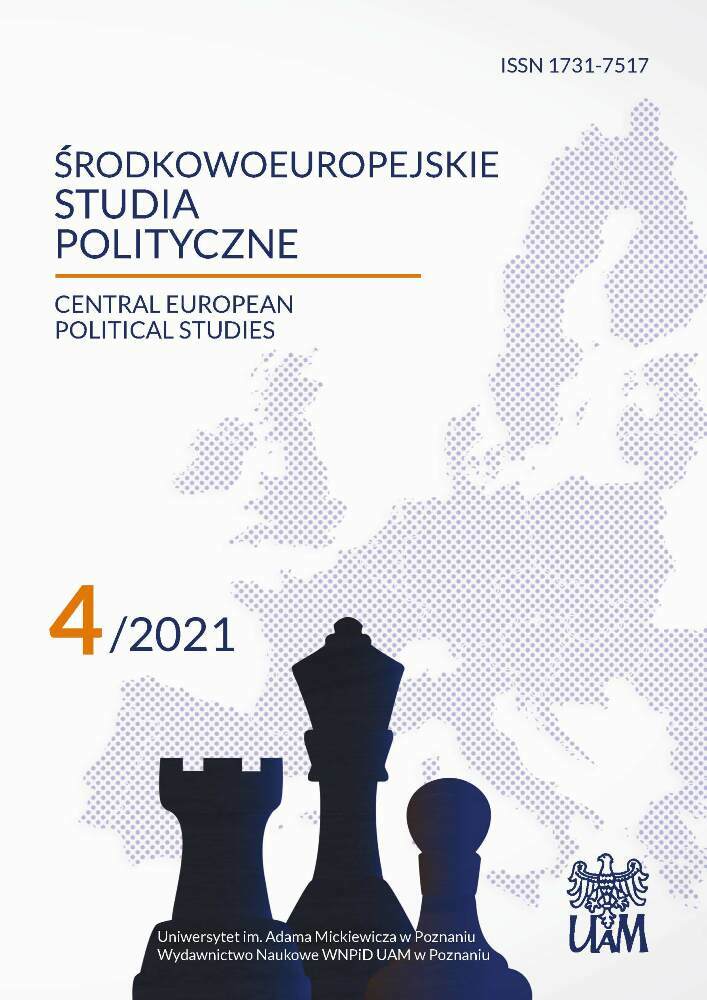Abstrakt
Na początku 2020 roku świat zetknął się z nowym i niespodziewanym wyzwaniem. Tak niesprzyjająca sytuacja ma potencjał zwiększenia napięć wśród społeczeństw i budowania sytuacji braku zaufania obywateli wobec własnych rządów i Unii Europejskiej. W odniesieniu do tych obserwacji główna hipoteza badawcza to założenie, że podczas pandemii zmniejszyło się zaufanie obywateli wobec państw członkowskich Unii Europejskiej w stosunku do lat poprzednich. W związku z tym celem badania jest identyfikacja dynamiki zmiany zaufania wobec Unii Europejskiej wśród jej państw członkowskich. Przedmiotem badania są obywatele Unii Europejskiej oraz skupienie na dynamice poziomu zaufania w latach 2016–2020 badane na podstawie wybranych wskaźników. Wykorzystane dane pochodzą z systemu Eurobarometr. Na potrzeby analizy posłużono się metodą analizy statystycznej (częstości i tablic krzyżowych) oraz porównawczej. Wydaje się, że na makropoziomie decydenci europejscy mogli sobie poradzić lepiej, zwłaszcza na wstępnych etapach wybuchu pandemii COVID-19. Wyniki ankiety przeprowadzonej przez Eurobarometr latem 2020 roku pokazują, że sytuacja różni się między państwami, czego jednak nie zaprezentowano w niniejszym badaniu. Z tego powodu potrzeba dalszych analiz skupionych na kontekście każdego państwa, tj. polityk szczegółowych i poziomu restrykcyjności wykorzystanych środków.
Bibliografia
Aksoy C. G., Cabrales A., Dolls M., Windsteiger L. (2020), COVID-19, trust and solidarity in the EU, EconPol Policy Report, no. 27, ifo Institute – Leibniz Institute for Economic Research at the University of Munich, Munich, http://hdl.handle.net/10419/233530.
Almond G., Verba S. (1989), The Civic Culture: Political Attitudes and Democracy in Five Nations, SAGE, Thousand Oaks.
Bargain O., Aminjonov U. (2020), Trust and compliance to public health policies in times of COVID-19, “Journal of Public Economics”, vol. 192, https://doi.org/10.1016/j.jpubeco.2020.104316.
Blagoeva Bl. (2014), Political culture and political socialization, in: Fundamentals of political sociology, ed. D. Naneva, UI “Paisii Hilendarski”, Plovdiv.
Brendebach J., Poiares Pessoa Maduro L. M., Tassinari F. (2020), The EU response to the COVID-19 pandemic: achieving relevance, mobilising solidarity and preparing for the future, STG Policy Briefs, http://hdl.handle.net/1814/66789.
Deutsche Welle (2020), Angela Merkel says EU leaders’ remain apart’ on coronavirus recovery deal, 13.07.2020, https://www.dw.com/en/merkel-eu-recovery-deal/a-54164187.
Devine D., Gaskell J., Jennings W., Stoker J. (2021), Trust and the Coronavirus Pandemic: What are the Consequences of and for Trust? An Early Review of the Literature, “Political Studies Review”, vol. 19, no. 2, doi: 10.1177/1478929920948684.
Dodsworth S., Cheeseman N. (2020), Political trust: The glue that keeps democracies together, Westminster Foundation for Democracy, London, https://www.agora-parl.org/sites/default/files/agora-documents/Political%20trust%20-%20The%20glue%20that%20keeps%20democracies%20together.pdf.
Eurofound (2021), Living, working and COVID-19 (Update April 2021): Mental health and trust decline across EU as pandemic enters another year, Publications Office of the European Union, Luxembourg, doi:10.2806/76802.
European Commission, Brussels (2017), Eurobarometer 87.3 (2017), GESIS data archive, Cologne. ZA6863 data file version 1.0.0, https://doi.org/10.4232/1.12847.
European Commission, Brussels (2018), Eurobarometer 89.1 (2018), GESIS data archive, Cologne. ZA6963 data file version 1.0.0, https://doi.org/10.4232/1.13154.
European Commission, Brussels (2019), Eurobarometer 91.2 (2019), GESIS data archive, Cologne. ZA7562 data file version 1.0.0, https://doi.org/10.4232/1.13318.
European Commission, Brussels (2020), Eurobarometer 85.2 (2016), GESIS data archive, Cologne. ZA6694 data file version 2.0.0, https://doi.org/10.4232/1.13438.
European Commission, Brussels (2021), Eurobarometer 93.1 (2020), GESIS data archive, Cologne. ZA7649 data file version 1.1.0, https://doi.org/10.4232/1.13696.
European Council (2021), Special European Council, 17–21 July 2020, https://www.consilium.europa.eu/en/meetings/european-council/2020/07/17-21/.
Herszenhorn D. M., Paun C., Deutsch J. (2020), Europe fails to help Italy in coronavirus fight, “Politico”, March 5, 2020, https://www.politico.eu/article/eu-aims-better-control-coronavirus-responses/.
Khemani S. (2020), An Opportunity to Build Legitimacy and Trust in Public Institutions in the Time of COVID-19, World Bank, Washington, DC, https://openknowledge.worldbank.org/handle/10986/33715 License: CC BY 3.0 IGO.
Marien S., Hooghe M. (2011), Does political trust matter? An empirical investigation into the relation between political trust and support for law compliance, “European Journal of Political Research”, vol. 50, doi: 10.1111/j.1475-6765.2010.01930.x.
Oksanen A., Kaakinen M., Latikka R., Savolainen I., Savela N., Koivula A. (2020), Regulation and Trust: 3-Month Follow-up Study on COVID-19 Mortality in 25 European Countries, “JMIR Public Health Surveill”, vol. 6, no. 2, doi: 10.2196/19218.
Ortenzi F., Albanse E., Fadda M. (2020), A Transdisciplinary Analysis of COVID-19 in Italy: The Most Affected Country in Europe, “Int. J. Environ. Res. Public Health”, vol. 17, no. 24, https://doi.org/10.3390/ijerph17249488.
Sabat I., Neuman-Böhme S., Varghese N. E., Barros P. P., Brouwer W., van Exel J., Schreyögg J., Stargardt T. (2020), United but divided: Policy responses and people’s perceptions in the EU during the COVID-19 outbreak, “Health Policy”, vol. 124, no. 9, https://doi.org/10.1016/j.healthpol.2020.06.009.
Schraff D. (2020), Political trust during the Covid-19 pandemic: Rally around the flag or lockdown effects?, “European Journal of Political Research”, https://doi.org/10.1111/1475-6765.12425.
Shi T. (2001), Cultural Values and Political Trust: A Comparison of the People’s Republic of China and Taiwan, “Comparative Politics”, vol. 33, no. 4, doi:10.2307/422441.
Yang H. wen (2021) Comparing the Political Trust and Civic Political Culture of Democracy or Authoritarian in Asian Countries, “International Journal of Research –GRANTHAALAYAH”, vol. 9, no. 2, doi: 10.29121/granthaalayah.v9.i2.2021.3491.
Licencja
Prawa autorskie (c) 2021 Daniela Pastarmadzhieva, Mina Angelova

Utwór dostępny jest na licencji Creative Commons Uznanie autorstwa 4.0 Międzynarodowe.

